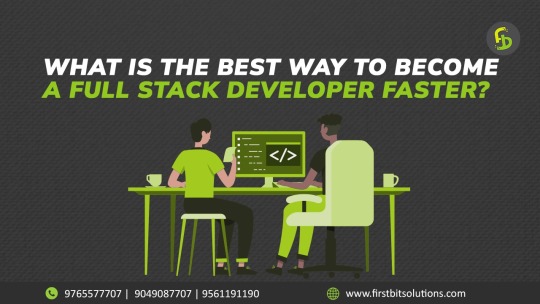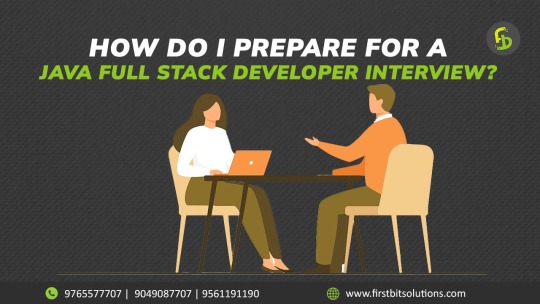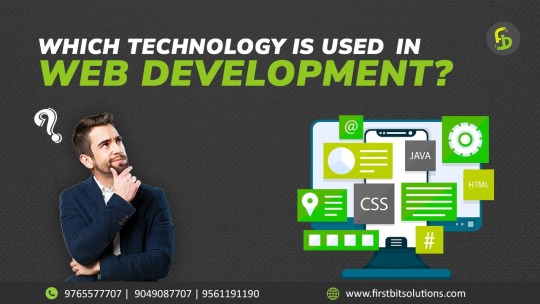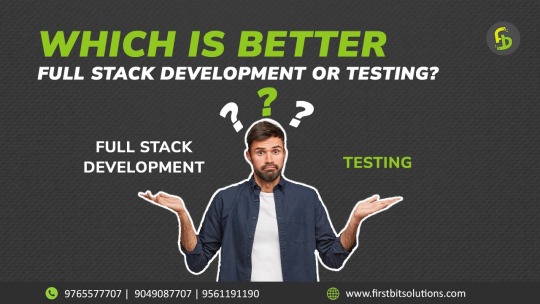Text
What is the best way to become a full stack developer faster?

The Fastest Path to Becoming a Full Stack Developer: A Roadmap
Do you want to become a full stack developer is one of the most sought-after career paths in today’s tech industry. Full stack developers have the unique ability to handle both front-end (client-side) and back-end (server-side) development, making them incredibly versatile. However, learning both areas can be overwhelming. To accelerate your journey, you need a structured approach, hands-on experience, and the right mindset. In this blog, I’ll outline a streamlined path to help you become a full stack developer faster while ensuring you build a solid foundation.
1. Understand the Role of a Full Stack Developer
A full stack developer works on the entire software stack, including:
Front-end: Building the user interface (UI) and user experience (UX) with technologies like HTML, CSS, and JavaScript.
Back-end: Managing databases, server logic, APIs, and application functionality with languages like Python, Java, or Node.js.
Database Management: Working with databases like MySQL, MongoDB, or PostgreSQL.
Version Control & Deployment: Using Git, CI/CD pipelines, and cloud services to deploy and maintain applications.
2. Learn the Basics First
Before getting into full stack development, ensure you’re comfortable with programming fundamentals. If you’re already familiar with basic coding concepts, this step will go quickly. Key areas to focus on:
HTML, CSS, JavaScript: Master the building blocks of web development.
Data Structures & Algorithms: Understanding basic algorithms will help you write more efficient code.
Basic Database Queries: Know how to use SQL or NoSQL databases.
If you're starting from scratch, consider taking fast-paced online courses or bootcamps that offer these basics in a compact timeline. Platforms like FirstBit Solutions Online courses are great for this.
3. Choose a Tech Stack
To speed up your learning, focus on one full stack at a time. Here are popular options:
MERN Stack (MongoDB, Express.js, React.js, Node.js) – This stack is JavaScript-based and allows for both front-end and back-end development in the same language.
LAMP Stack (Linux, Apache, MySQL, PHP) – A well-established stack, especially useful for server-side scripting.
MEAN Stack (MongoDB, Express.js, Angular, Node.js) – Similar to MERN but with Angular for front-end development.
Python Full Stack (Django/Flask for back-end, React.js/Angular for front-end) – Great if you prefer Python as a back-end language.
Pick the stack that interests you most and stick with it to avoid getting overwhelmed by too many technologies.
4. Focus on JavaScript
JavaScript is the backbone of modern web development, and mastering it will make your path faster. As a full stack developer, you’ll be using JavaScript on both the front end (React, Angular) and back end (Node.js). Learn:
ES6+ features: Arrow functions, destructuring, async/await.
DOM manipulation: Understand how to work with HTML dynamically.
AJAX & Fetch: Learn how to send and retrieve data asynchronously.
Node.js & Express: Build server-side applications and APIs.
JavaScript is often the fastest way to become full stack because you don’t need to switch between different languages for front-end and back-end development.
5. Get Hands-On with Projects
The fastest way to learn full stack development is by building real-world projects. Start small, but aim to gradually increase complexity. This will not only build your skills but also your portfolio, which is crucial for job hunting.
Basic Projects: Build a simple landing page, to-do list, or blog.
Intermediate Projects: Create a CRUD (Create, Read, Update, Delete) application, like a user management system.
Advanced Projects: Build a full-fledged e-commerce app, chat application, or social media platform with user authentication, payments, and databases.
While working on these projects, learn to debug effectively. Understanding how to fix errors and optimize code will save you a lot of time.
6. Learn Git and Version Control
Collaboration and version control are essential skills for developers. Git is the most widely used version control system, and knowing how to manage repositories, branches, commits, and pull requests will make you more efficient. This is also a key skill in real-world team projects.
7. Work on Back-End Development
Once you're comfortable with front-end technologies, it's time to learn back-end development. Start by:
Building RESTful APIs: Learn how to create, read, update, and delete (CRUD) data using APIs. Express.js is a good choice for building APIs with Node.js.
Authentication & Authorization: Implement user login systems with technologies like JWT (JSON Web Tokens).
Database Management: Understand how to connect, query, and manage databases (SQL or NoSQL). Use ORMs like Mongoose (for MongoDB) or Sequelize (for SQL databases).
8. Practice, Practice, Practice
Consistent practice is key to speeding up your learning. Set aside dedicated time every day to code, even if it’s just for 30 minutes. Take part in coding challenges on platforms like LeetCode, HackerRank, or Codewars to sharpen your skills, in FirstBit solutions we take mocks where you will know the meaning of why practice matters.
9. Learn DevOps and Deployment
To become a full stack developer, you need to understand how to deploy applications to the web. Learn:
Basic DevOps Tools: Familiarize yourself with Docker, CI/CD pipelines, and automated testing.
Cloud Platforms: Get comfortable with cloud services like AWS, Heroku, or DigitalOcean to deploy and manage your applications.
Conclusion
Becoming a full stack developer faster requires focus, dedication, and smart learning. By mastering essential technologies, building real-world projects, and staying consistent, you can achieve your goal in less time than you think. Remember, the key is not just speed but also building a strong foundation to succeed in your career long term.
With the right approach, dedication, and a passion for learning, you’ll be coding like a pro in no time!
0 notes
Text
How do I prepare for a Java full stack developer interview?

Preparing for a Java Full Stack Developer interview requires a blend of technical knowledge, hands-on experience, and good problem-solving skills. Here's a guide to help you get interview-ready, along with the mock test practices we conduct at FirstBit Solutions.
1. Solidify Your Java Basics
Core Java Concepts: Ensure you are clear on Object-Oriented Programming (OOP) principles, exception handling, collections, multithreading, and Java 8 features like streams and lambda expressions.
Hands-on Practice: Coding problems around data structures, algorithms, and solving common interview questions will help you get comfortable with Java fundamentals.
2. Master Front-end Development
HTML, CSS, and JavaScript: Be proficient in creating responsive web pages. Know how to use JavaScript frameworks like React or Angular for building dynamic and interactive front-ends.
Frameworks & Tools: Be familiar with Bootstrap for styling, and JavaScript ES6+ features for improved code writing.
3. Deep Dive into Back-end Technologies
Spring Framework: Learn Spring Boot, Spring MVC, and how to build RESTful services. This is crucial as most full stack projects use Spring for back-end development.
Hibernate & JPA: Knowing how to work with databases and perform object-relational mapping (ORM) is essential.
Microservices: Understanding how to build and manage microservices architecture using Java is increasingly important.
4. Databases
SQL/NoSQL Databases: Have a good understanding of SQL databases like MySQL or PostgreSQL, as well as NoSQL databases like MongoDB.
Query Optimization: Be prepared to answer questions on query optimization and efficient data retrieval techniques.
5. Version Control & DevOps Basics
Git: Know how to manage code repositories using Git, push, pull requests, and merging code.
CI/CD Pipelines: Understand the basics of Jenkins, Docker, and Kubernetes to know how code moves from development to production.
6. Soft Skills & Problem-Solving
Team Collaboration: Be prepared to showcase how you work in teams, communicate effectively, and handle project management tools like Jira or Trello.
Problem-Solving: Practice live coding sessions and technical questions on platforms like LeetCode, Code Signal, or Hacker Rank to enhance your algorithm-solving skills.
Mock Test Practices at FirstBit Solutions
At FirstBit Solutions, we conduct regular mock tests and interview simulations to help you get real-time feedback. Here’s how our mock tests prepare you:
Technical Rounds: These cover Java basics, Spring, Hibernate, front-end development with JavaScript, and problem-solving. The focus is on building clean, efficient code.
Hands-on Projects: You'll be given small projects to showcase your ability to develop both front-end and back-end solutions.
HR Interview Practice: Our sessions prepare you to communicate clearly, articulate your strengths, and answer behavioural questions confidently.
Mock tests provide a well-rounded preparation, helping you understand your strengths and the areas where you need improvement. You’ll receive constructive feedback after each round to ensure you’re ready to face the interview with confidence.
Conclusion
Preparing for a Java Full Stack Developer interview involves mastering both front-end and back-end technologies, honing your problem-solving skills, and participating in mock tests to simulate real interview conditions. At FirstBit Solutions, we support you through this journey with regular tests, hands-on projects, and personalized feedback.
Good luck with your interview preparation!
#education#programming#tech#technology#training#fullstack#fullstackdeveloper#developer#interview#interviewtips#job interview
0 notes
Text
Is Coding Required for a Web Developer?

Is Coding Required for a Web Developer?
Absolutely! Coding is the backbone of web development. Whether you're building a simple static website or a complex web application, coding is an essential skill that allows you to bring your ideas to life in the digital world.
Why Is Coding Important for Web Development?
Web development is all about creating, maintaining, and improving websites. To do this, web developers must know how to write and understand code in several languages. Here are some core areas where coding is required:
Front-End Development (Client-Side)
Languages: HTML, CSS, JavaScript
These are the building blocks of the web. HTML structures the content, CSS designs the visual layout, and JavaScript brings interactivity. Without these, a website is just plain text on a screen.
Back-End Development (Server-Side)
Languages: Node.js, Python, Ruby, PHP
The back-end handles the behind-the-scenes functionality of websites, including database interactions, user authentication, and server configuration. Back-end developers write code to ensure everything works smoothly and efficiently.
Full Stack Development (Front-End + Back-End)
Full stack developers work on both the front-end and back-end, so they need proficiency in various coding languages to handle all aspects of a website or web application.
Learn Web Development with FirstBit Solutions
At FirstBit Solutions, we provide comprehensive training in web development, guiding students from the basics to advanced levels. Whether you’re just starting or looking to enhance your skills, we offer courses tailored to your needs.
Our MEAN/MERN Batch is specifically designed for aspiring web developers. These are popular stacks used in modern web development:
MEAN Stack: MongoDB, Express.js, Angular, and Node.js
MERN Stack: MongoDB, Express.js, React, and Node.js
Both stacks provide a complete framework for developing robust web applications using JavaScript from front-end to back-end.
Why Choose FirstBit Solutions for Web Development?
Comprehensive Curriculum: We cover everything from the basics of HTML and CSS to advanced JavaScript frameworks like Angular and React.
Real-World Projects: You'll work on live projects that simulate real-world scenarios, ensuring you're industry-ready.
Placement Assistance: We don’t just train you – we help you land your first job as a web developer with our dedicated placement drives and career guidance.
Whether you're looking to build a personal website, become a full-stack developer, or start your career in tech, FirstBit Solutions is here to help you achieve your goals.
Ready to become a web developer? Enroll in our MEAN/MERN batch today and start your journey in web development!
#education#programming#tech#technology#training#web development#web developers#mean stack development#mern stack developer#angular#react#css#javascript
1 note
·
View note
Text
Which technology is used in web development?

Explore Your Path to Success in Web Development with FirstBit Solutions
In today’s digital age, web development is one of the most in-demand skills in the IT industry. From creating visually appealing websites to developing complex web applications, web developers are the driving force behind the internet's functionality and design. If you're aspiring to break into this exciting field, the right training and guidance can make all the difference. At FirstBit Solutions, we provide a comprehensive Full Stack MEAN/MERN Web Development course, designed to equip you with all the skills needed to excel in this fast-paced industry.
Why Choose Web Development?
The web development landscape is constantly evolving, offering an array of technologies and opportunities to grow. As a web developer, you'll be working with cutting-edge tools and technologies such as:
HTML, CSS, and JavaScript: The foundational languages of web development, essential for building the structure, style, and interactivity of websites.
Frontend Frameworks: Popular choices include React (for the MERN stack) and Angular (for the MEAN stack), both of which allow for creating dynamic and responsive web applications.
Backend Technologies: Learn Node.js, a powerful runtime environment, along with Express.js to handle the server-side of your applications.
Databases: Understand how to manage data with MongoDB, a NoSQL database that plays a vital role in both MEAN and MERN stacks.
Why Choose FirstBit Solutions?
At FirstBit Solutions, we believe in offering not just education, but a holistic experience that prepares you for real-world challenges. Our Full Stack Web Development Course is designed with the latest industry trends in mind, giving you the tools to succeed. Here’s what you can expect:
Full Stack MEAN/MERN TrainingGet deep into the full stack of technologies including MongoDB, Express.js, Angular (or React), and Node.js. You’ll learn how to build complete, scalable applications from scratch, starting from the frontend interface to the backend server.
75+ Hours of Free Demo SessionsWe understand that choosing the right course can be overwhelming. That’s why we offer 75+ hours of free demo sessions, allowing you to experience our teaching methods and curriculum before making a commitment.
Soft Skills, Aptitude, and English SpeakingIn addition to technical skills, we focus on enhancing your soft skills, aptitude, and English-speaking abilities. These are crucial for excelling in interviews and in a professional environment, ensuring you're prepared for all aspects of your career.
Lifetime LMS AccessYou’ll have lifetime access to our Learning Management System (LMS), which is packed with video tutorials, assignments, and projects. This means you can revisit topics, brush up on concepts, and continue learning at your own pace, long after the course is completed.
100% Unlimited Placement Call GuaranteeOur commitment doesn’t end with the course. We provide 100% placement assistance with unlimited placement calls until you secure your dream job. We partner with top IT companies to help you get started in your career.
Learn, Grow, and ExploreAt FirstBit Solutions, you’re not just learning code. You’re joining a community that encourages you to grow, explore new opportunities, and continuously improve your skills. With a team of experienced instructors and industry experts, we offer the best place to start your journey in web development.
Whether you’re a fresh graduate, a working professional looking to upskill, or someone seeking a career change, our Full Stack Web Development Course offers you the perfect opportunity to learn, grow, and explore the ever-expanding world of IT. With FirstBit Solutions, you have the tools, resources, and guidance needed to excel in web development.
Enroll Today!
Don’t miss the chance to start your career with a program that guarantees unlimited opportunities. Enroll today in our Full Stack MEAN/MERN Web Development Course, and take the first step towards building a rewarding and successful career in IT.
At FirstBit Solutions, we’re here to help you every step of the way. From expert training and industry insights to hands-on projects and placement assistance, we provide everything you need to succeed. Let’s build the future—together.
#education#programming#tech#technology#training#web development company#website#developer#meanstack#mernstack#fullstackdevelopment#java developers#firstbitsolutions
1 note
·
View note
Text
Which is better full stack development or testing?

Full Stack Development vs Software Testing: Which Career Path is Right for You?
In today’s rapidly evolving IT industry, choosing the right career path can be challenging. Two popular options are Full Stack Development and Software Testing. Both of these fields offer unique opportunities and cater to different skill sets, making it essential to assess which one aligns better with your interests, goals, and long-term career aspirations.
At FirstBit Solutions, we take pride in offering a premium quality of teaching, with expert-led courses designed to provide real-world skills. Our goal is to help you know, no matter which path you choose. Whether you’re interested in development or testing, our 100% unlimited placement call guarantee ensures ample job opportunities. In this answer, we’ll explore both career paths to help you make an informed decision.
Understanding Full Stack Development
What is Full Stack Development?
Full Stack Development involves working on both the front-end (client-side) and back-end (server-side) of web applications. Full stack developers handle everything from designing the user interface (UI) to managing databases and server logic. They are versatile professionals who can oversee a project from start to finish.
Key Skills Required for Full Stack Development
To become a full stack developer, you need a diverse set of skills, including:
Front-End Technologies: HTML, CSS, and JavaScript are the fundamental building blocks of web development. Additionally, proficiency in front-end frameworks like React, Angular, or Vue.js is crucial for creating dynamic and responsive web interfaces.
Back-End Technologies: Understanding back-end programming languages like Node.js, Python, Ruby, Java, or PHP is essential for server-side development. Additionally, knowledge of frameworks like Express.js, Django, or Spring can help streamline development processes.
Databases: Full stack developers must know how to work with both SQL (e.g., MySQL, PostgreSQL) and NoSQL (e.g., MongoDB) databases.
Version Control and Collaboration: Proficiency in tools like Git, GitHub, and agile methodologies is important for working in a collaborative environment.
Job Opportunities in Full Stack Development
Full stack developers are in high demand due to their versatility. Companies often prefer professionals who can handle both front-end and back-end tasks, making them valuable assets in any development team. Full stack developers can work in:
Web Development
Mobile App Development
Enterprise Solutions
Startup Ecosystems
The flexibility to work on multiple layers of development opens doors to various career opportunities. Moreover, the continuous rise of startups and digital transformation initiatives has further fueled the demand for full stack developers.
Benefits of Choosing Full Stack Development
High Demand: The need for full stack developers is constantly increasing across industries, making it a lucrative career choice.
Versatility: You can switch between front-end and back-end tasks, giving you a holistic understanding of how applications work.
Creativity: If you enjoy creating visually appealing interfaces while also solving complex back-end problems, full stack development allows you to engage both creative and logical thinking.
Salary: Full stack developers typically enjoy competitive salaries due to their wide skill set and ability to handle various tasks.
Understanding Software Testing
What is Software Testing?
Software Testing is the process of evaluating and verifying that a software product or application is free of defects, meets specified requirements, and functions as expected. Testers ensure the quality and reliability of software by conducting both manual and automated tests.
Key Skills Required for Software Testing
To succeed in software testing, you need to develop the following skills:
Manual Testing: Knowledge of testing techniques, understanding different testing types (unit, integration, system, UAT, etc.), and the ability to write test cases are fundamental for manual testing.
Automated Testing: Proficiency in tools like Selenium, JUnit, TestNG, or Cucumber is essential for automating repetitive test scenarios and improving efficiency.
Attention to Detail: Testers must have a keen eye for identifying potential issues, bugs, and vulnerabilities in software systems.
Scripting Knowledge: Basic programming skills in languages like Java, Python, or JavaScript are necessary to write and maintain test scripts for automated testing.
Job Opportunities in Software Testing
As the demand for high-quality software increases, so does the need for skilled software testers. Companies are investing heavily in testing to ensure that their products perform optimally in the competitive market. Software testers can work in:
Manual Testing
Automated Testing
Quality Assurance (QA) Engineering
Test Automation Development
With the rise of Agile and DevOps methodologies, the role of testers has become even more critical. Continuous integration and continuous delivery (CI/CD) pipelines rely on automated testing to deliver reliable software faster.
Benefits of Choosing Software Testing
Job Security: With software quality being paramount, skilled testers are in high demand, and the need for testing professionals will only continue to grow.
Quality Assurance: If you have a knack for perfection and enjoy ensuring that software works flawlessly, testing could be a satisfying career.
Automated Testing Growth: The shift toward automation opens up new opportunities for testers to specialize in test automation tools and frameworks, which are essential for faster releases.
Flexibility: Testing provides opportunities to work across different domains and industries, as almost every software product requires thorough testing.
Full Stack Development vs Software Testing: A Comparative Analysis
Let’s break down the major factors that could influence your decision:
Factors
Full Stack Development
Software Testing
Skills
Proficiency in front-end and back-end technologies, databases
Manual and automated testing, attention to detail, scripting
Creativity
High – involves creating and designing both UI and logic
Moderate – focuses on improving software through testing and validation
Job Roles
Web Developer, Full Stack Engineer, Mobile App Developer
QA Engineer, Test Automation Engineer, Software Tester
Career Growth
Opportunities to transition into senior roles like CTO or Solution Architect
Growth towards roles in automation and quality management
Salary
Competitive with wide-ranging opportunities
Competitive, with automation testers in higher demand
Demand
High demand due to increasing digitalization and web-based applications
Consistently high, especially in Agile/DevOps environments
Learning Curve
Steep – requires mastering multiple languages and technologies
Moderate – requires a focus on testing tools, techniques, and automation
Why Choose FirstBit Solutions for Full Stack Development or Software Testing?
At FirstBit Solutions, we provide comprehensive training in both full stack development and software testing. Our experienced faculty ensures that you gain hands-on experience and practical knowledge in the field of your choice. Our 100% unlimited placement call guarantee ensures that you have ample opportunities to land your dream job, no matter which course you pursue. Here’s why FirstBit is your ideal training partner:
Expert Trainers: Learn from industry veterans with years of experience in development and testing.
Real-World Projects: Work on real-world projects that simulate industry scenarios, providing you with the practical experience needed to excel.
Job Assistance: Our robust placement support ensures you have access to job openings with top companies.
Flexible Learning: Choose from online and offline batch options to fit your schedule.
Conclusion: Which Career Path is Right for You?
Ultimately, the choice between full stack development and software testing comes down to your personal interests, skills, and career aspirations. If you’re someone who enjoys building applications from the ground up, full stack development might be the perfect fit for you. On the other hand, if you take satisfaction in ensuring that software is of the highest quality, software testing could be your calling.
At FirstBit Solutions, we provide top-notch training in both fields, allowing you to pursue your passion and build a successful career in the IT industry. With our industry-aligned curriculum, expert guidance, and 100% placement call guarantee, your future is in good hands.
So, what are you waiting for? Choose the course that excites you and start your journey toward a rewarding career today!
#education#programming#tech#technology#training#python#full stack developer#software testing#itservices#java#.net#.net developers#datascience
2 notes
·
View notes